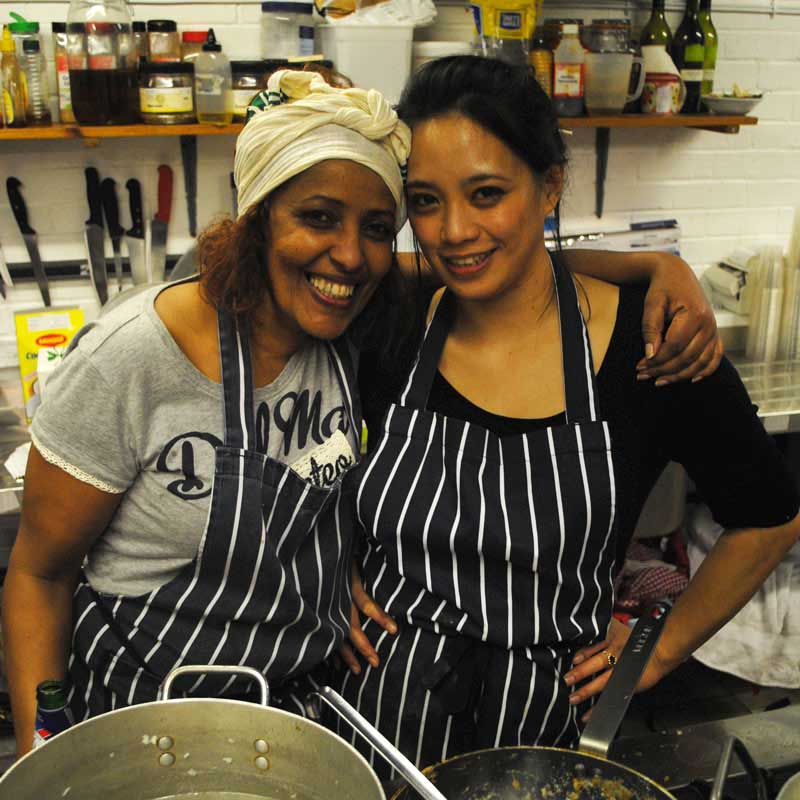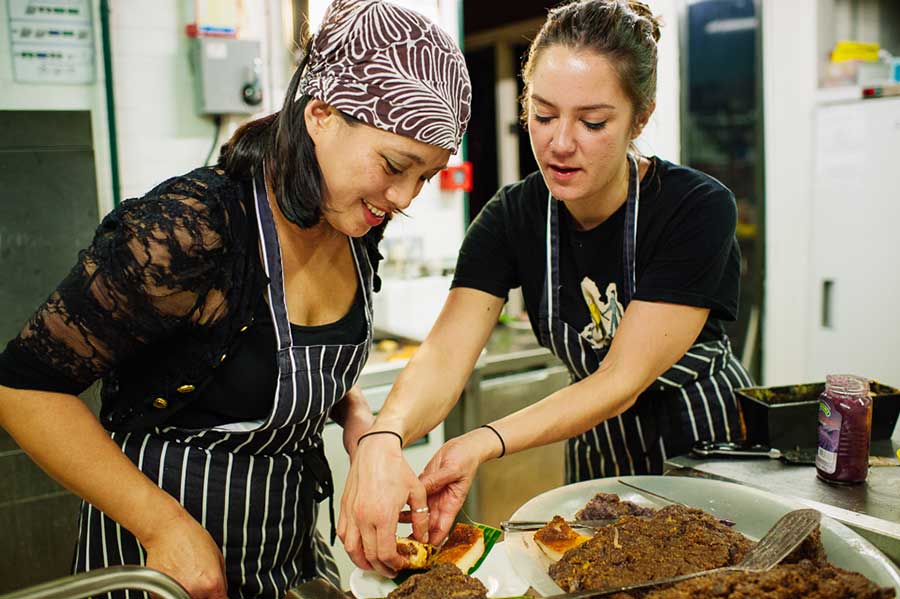Is it Greek? Is it Filipino? Is it Brazilian? Is it Middle Eastern? Is it Senegalese? Visit Mazi Mas restaurant in London and you’d be forgiven for being just a little confused over the style of food being served.
That’s because entrepreneur Nikandre Kopke has decided that female immigrants from around the world deserve a chance at taking control of their lives – all within the same kitchen. And what an incredible gift from the immigrant to their new neighbors – a way to connect their worlds over a delicious meal.
Kopke’s journey to empowering women and establishing one of the world’s most unusual restaurants is personal. She was inspired by her Greek godmother, an immigrant to the U.S., who for 20 years dreamt what many other migrant women dream of – opening a food business of their own. She wanted to open a bakery yet was held back by a typically patriarchal husband who didn’t think women should run their own business. Destined to stay home, cook and take care of the children, she never got the chance to realize her dream. As a result of family circumstance, Kopke was sent to live with her as a little girl and became her protégé, learning all the amazing culinary talents that had never left the house. “She was never able to become an independent businesswoman in her own right, yet she would have been amazing at it,” says Kopke.
When Kopke moved from the U.S. to London, it was a story she saw everywhere. She volunteered to work in kitchens and migrant centers and met a lot of women who had incredible talent because they’d spent their lives in kitchens at home, with no outlet for their skills. “I thought what an amazing opportunity this was,” recalls Kopke. “It seemed very simple for me to give these women an opportunity, a platform to capitalize on skills they already had. It also cemented the legacy of my godmother, one of the most important people in the world to me.”
Kopke is no stranger to multi-culturalism. She was raised in New York by a German father and a Greek mother and now lives in London. It gave her a familiarity and strength in identifying with women from other cultures and helped her realize that, essentially, all women shared a similar burden – cast into a role by virtue of being a woman.
Kopke is quick to point out that she despises any suggestion of charity in her work. “The idea of charity goes against everything I’m trying to do,” she says. “These women are agents of change because so often women are cast as vulnerable victims, as victims of their circumstances, rather than people with incredible economic potential. They have huge potential to be their own boss, it’s just that they’ve never been given an opportunity to capitalize on it.”
“I have no interest in contributing to this narrative of victimhood, which is so common when speaking about migrant and refugee women. Mazi Mas will never be a charity, because these women are not charity cases. They are aspiring food entrepreneurs.”
Mazi Mas has turned the tables on brick-and-mortar stores too. The women do brief, short-term cooking residencies in underused kitchens around London that have been lying dormant, such as a kitchen at a theater. They are pioneering the art of the pop-up restaurant and recycling dormant commercial space into hives of economic activity while offering guests delicious cuisine in an otherwise underserved environment.
Yet, behind dishes such as marinated fish and kare-kare oxtail in peanut sauce lies a deep philosophy on empowering men and women through gender awareness.

“Some of the most amazing initiatives to come out of gender equality have been the campaigns led by men to educate other men on gender issues,” says Kopke. “Change in the terminology we use has been telling. It used to be women’s rights, now it’s gender equality, gender inequality and gender issues that are spoken of. This is symbolic as it recognizes these issues not only affect women, but men as well.”
Kopke is clear that she is retraining people and giving them a platform to use their skills, but funders hear the words “social enterprise restaurant” and stop listening; not that this business model is untried.
Waterhouse Restaurant in London provides skills and training to young people from the surrounding area and was voted runner-up for Best Ethical Restaurant in 2013. Jamie Oliver’s Fifteen Restaurant is probably the most famous example – empowering young, unemployed youth in Cornwall to become the chefs of the future.
Having skilled people at Mazi Mas, who aren’t being retrained and aren’t being encouraged to follow a celebrity chef’s vision (but rather their own) can have its drawbacks. A celebrity chef with massive, existing marketing behind them does have its advantages.
Six women from the Philippines, Brazil, Senegal, Ethiopia, Iran and Peru make up the current batch of Mazi Mas chefs, with another 10 busy with the application process. Their individual cooking experience ranges from 10 to 30 years. The restaurant takes inspiration from small family-run restaurants in Greece where Kopke lived as a child and the international variety comes from the diverse experiences of women from around the world.
One night customers are treated to Filipino cooking and the next night Senegalese. “It’s about educating people a little,” says Kopke. “In the U.K., it’s very unusual to have a menu that changes every day, but it should be normal. An ever-changing menu does run the risk of more food waste, but I’m working with women from low-income countries who understand the value of sustainability by not wasting anything. I don’t have to teach them this as it’s already there,” explains Kopke.
Kopke cites New York-based organization Hot Bread Kitchen as an inspiration that also employs migrant women to produce mostly baked goods. “If they can make a mainstream, commercial success of it then so can I,” she says. “The difference is that I want to make my people visible, not cloister women away in an assembly line out of sight. These are women who have spent their lives being invisible.”
Mazi Mas has a sister organization in Sydney and Kopke is developing plans with people in Italy. The business can scale easily and be replicated anywhere in the world, depending on local labor laws. In the U.K., asylum seekers don’t have the right to work but in Australia they do.
The investment Kopke’s godmother made in her is finally paying dividends and influencing the lives of women from around the world. She never could have imagined that her goddaughter would find the strength one day to break a generations-old cycle of gender bias. “She’s really amazing,” says Kopke. “But with the classic humility many women of her era have, she says ‘Agh, it has nothing to do with me, it only has to do with you.’”




































